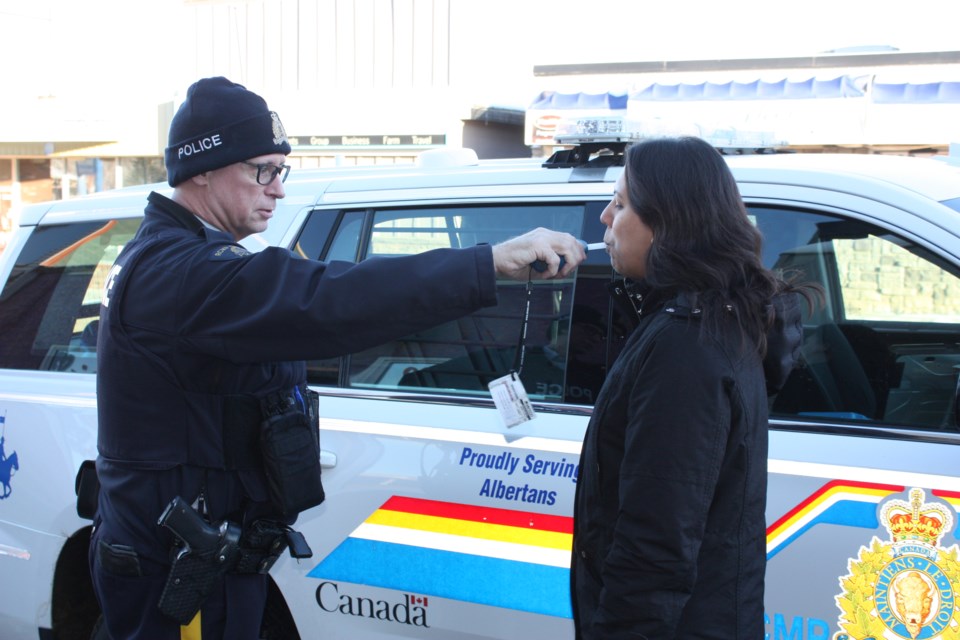ATHABASCA – It has now been four years since Bill C-46 came into effect across the country, but many drivers are still shocked to find they are now legally required to provide a preliminary breath sample on the spot as part of any routine traffic stop.
It would be an understatement to say RCMP have always taken impaired driving seriously, but with legislation at both the federal and provincial level, the laws they are enforcing now have an immediate impact and the teeth to take those drivers off the road.
Bill C-46, An Act to amend the Criminal Code (offences relating to conveyances) and to make consequential amendments to other Acts, first came to Parliament in mid-2017 and became law in December 2018, giving officers increased powers to demand a mandatory alcohol screening (MAS) from any driver that is lawfully pulled over without requiring a reasonable suspicion they have consumed alcohol.
It’s now just part of the process of being pulled over in a vehicle, said Boyle/Athabasca RCMP traffic unit officers Sgt. Lee Simpkins and Const. Paul Banks in an interview at the Advocate office last week, but officers continue to see resistance from drivers when they make the demand, even more than usual.
“What I’m finding is there's still a lot of motorists who are not aware of this … and we do get a lot of feedback regarding that,” said Banks. “I'm getting a lot of political rhetoric. The word Trudeau comes up a lot.”
Banks has found that those who are very skeptical or doubtful about his authority usually come around once the consequences of refusal are.
“Then for the most part they will comply,” he said.
And there’s no distinction between drivers either, Simpkins said, as non-biased policing is always the practice. Everyone can expect to hear a demand from the officer to participate in a mandatory alcohol screening when they are pulled over
“We’re ordered by our officer in charge to mandatory everyone. We’re not targeting specific people or drivers or age groups with MAS,” he said.
“It’s either you MAS everyone during a shift, or you MAS no one during a shift. It’s one or the other,” added Banks.
Note, the penalty for impaired driving is the same as refusing to provide a breath sample — a one-year mandatory driving prohibition and a minimum $1,000 fine on the first offence, which multiplies with subsequent offences. Drivers can apply for an Interlock device after 90 days.
Between them, Simpkins and Banks have been enforcing the laws of the highway for nearly three decades. Simpkins recently arrived in the area after spending most of his law enforcement career in northern B.C. He is a highly qualified substance recognition expert who trains other officers across North America, while Banks has been in the Athabasca area most of his RCMP career, all of it on the traffic beat.
While new to Canada, similar laws have been in force for years in the United States, Simpkins said. For instance, in Arizona, a driver must agree to submit to a chemical breath test as a requirement of gaining their licence.
There are two types of demands drivers may hear from an officer when they are pulled over — the MAS, which must be conducted immediately, and an ASD, an alcohol screening device demand.
To conduct a MAS a motorist must be in the driver’s seat, on a public roadway, which includes drive-thrus and parking lots, the screening device must be with the officer, and they officer must be involved in the lawful execution of their duty.
“Those four thresholds need to be met in order for the MAS to be provided to a driver. To give the ASD demand, we need suspicion,” said Simpkins.
Many drivers are also unaware of provincial Bill 21 which amended how immediate roadside sanctions are delivered in 2020, that now see an immediate licence suspension and 30-day vehicle seizure on the first offence, as well as a $1,000 fine, along with the cost of impound, a remediation course, an Interlock device, and any other costs that may arise.
Drugs too
Bill C-46 was introduced alongside the Cannabis Act as the federal government prepared to legalize cannabis, and as such impairment levels for cannabis users are also now baked into the legislation.
“When it came in, it really didn’t pick up. I think it’s becoming more socially acceptable. Still today, there is a role for ADSE-approved equipment around the market, and there are two on the market,” said Simpkins.
“The best way to detect drug impairment is through a standard field sobriety test, and if they perform poorly, we can move on to blood withdrawal and a drug recognition expert evaluation.”
With cannabis, there are limits, but for other drugs like heroin and cocaine, there is a zero-tolerance policy. These drugs are detectable by officers, simply by examining the pupil dilation of a driver, and proceeding from there.
There is also little tolerance for combining alcohol and other drugs, as it is especially impairing.
All that said, Simpkins and Banks and the rest of the combined traffic unit, will be out enforcing those laws over the Christmas break and beyond. It’s all about keeping the roads safe and driving sober to ensure everyone gets home to their loved ones every time.
“Your family should be able to drive to the supermarket without worrying about getting hit by an impaired driver. That has happened time and time again and taken so many innocent lives that it's got to stop. With our guys being out there MASing everybody curbs that behaviour,” Simpkons said.
In 2021, Alberta RCMP removed 6,787 impaired drivers from roads.



